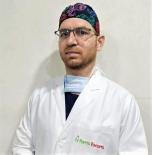About General and Minimal Access Surgery
What is Minimal Access Surgery
In minimal access surgery (MAS) or minimally invasive surgery (MIS), a surgeon can access various organs in the body through tiny cuts using advanced technology. This surgery is aimed at minimizing the cutting through the skin and tissues, causing less trauma to the person. MIS is a welcome change from traditional surgeries where significant cuts are made on the body. The procedure’s outcome is sometimes the same or better than conventional surgery, and the cost difference is minimal.
The Procedure
The surgeon inserts a telescope with a video camera through a keyhole-sized incision (usually only ¼” long) inside the human body. Then, surgical instruments are inserted into the body via similar incisions. The surgeon examines and operates on the target area by viewing magnified images on television through digitally transmitted images from the video camera inserted inside the body. The camera acts like a surgeon’s vision during surgery, allowing them to perform a critical operation efficiently.
Benefits of Minimal Access Surgery
- Enhanced Surgical Efficiency: Laparoscopic and robotic techniques allow the surgeon to get a better and clearer view of the human body to diagnose the condition accurately and treat it with precision.
- Reduced Trauma: The procedure minimally affects the surrounding tissues and organs because of smaller incisions. It leads to reduced postoperative pain and quicker recovery.
- Decreased Risk of Complications: The smaller incisions and reduced tissue trauma reduce the chances of infection and bleeding.
- Lesser Scarring: The procedure causes less noticeable scars and provides better cosmetic outcomes, especially on visible body areas.
- Shorter Stay at the Hospital: As patients who have undergone minimal access surgery recover faster, they spend less time in the hospital and can return to their everyday lives more quickly.
Types of Techniques Used in Minimal Access Surgery
- Laparoscopy: Laparoscopic surgery involves inserting a thin, flexible tube with a camera through a small incision. The camera gives a magnified view of the internal organs on a monitor, allowing the surgeon to perform the procedure precisely.
- Endoscopy: Endoscopic procedures involve inserting a long, thin tube with a camera and light through natural openings in the body, like the mouth or anus, to see and operate on internal organs.
- Robotic Surgery: Robot-assisted surgery utilizes robotic systems controlled by the surgeon. The surgeon operates robotic arms from a console, manipulating miniature instruments with enhanced dexterity and precision.
Applications of Minimal Access Surgery
Minimal access surgery has a wide range of applications across various medical specialties.
- Gastrointestinal Surgery: For procedures such as appendectomy (appendix removal), cholecystectomy (gallbladder removal), colectomy (colon removal), and hernia repair to relieve gastroesophageal reflux disease (GERD)
- Gynecological Surgery: For hysterectomy (uterus removal), ovarian cyst removal, and treatment of endometriosis and fibroids
- Urological Surgery: For procedures like prostatectomy (prostate gland removal), nephrectomy (kidney removal), pyeloplasty (removal of the blockage in the tube for urine passage), adrenalectomy (adrenal glands removal), and splenectomy (spleen removal)
- Cardiothoracic Surgery: For procedures such as coronary artery bypass grafting (CABG), valve repair or replacement, and lung resection
- Orthopedic Surgery: For orthopedic procedures like arthroscopic joint surgery and minimally invasive spine surgery
- Brain Surgery and Neurosurgery: To identify and treat conditions in the brain’s deeper parts
- Cancer Surgery: To gain better access to the affected site to destroy the tumor and increase the cure rate
- Endovascular Surgery: To treat or repair an aneurysm efficiently
- Otolaryngology (ENT/Head and Neck Surgery)
- Bariatric Surgery: For gastric sleeve surgery and gastric bypass surgery for weight loss
Risks of MAS
Although the procedure uses smaller surgical cuts and is less risky than open surgery, a few risks need to be considered.
- The procedure involves the usage of certain medicines to put people in a sleep-like state during surgery. These medicines can cause complications sometimes.
- Bleeding and infection might occur.
- The procedure lasts longer than open surgery.
- Since it needs some prior preparation (restriction of food and water, specific tests, and shaving of the area where the incision will be made), it might not work during an emergency or when the condition is not clear.
- The surgery involves pumping gases into the abdominal cavity to segregate the abdominal wall from the other organs. In some people, these gases might increase the risk of heart and lung complications during the surgery.
- Not all surgeries can be performed using this method. However, the reach of MAS is increasing with evolving technologies.
What to Expect After the Surgery?
- Due to the small cut, the surrounding muscles and tissues are left almost intact and don’t require healing after the procedure. In case of pain or soreness, the doctor may prescribe mild painkillers.
- Most people are advised to go home and rest (less workload) on the same day or within 1–2 days after the surgery and resume a regular diet. However, the return to the normal routine varies on a case-by-case basis, with the total recovery time ranging around six weeks.
- The doctor might advise physical therapy that includes stretches and other exercises to strengthen muscles, mainly if the surgery is done around the spine.
- The surgical wound requires care. Sometimes, there may be a leakage of fluid from the incision, which is normal. But if the quantity of fluid increases or there are signs of an infection accompanied by pain, the doctor must be consulted immediately.
MAS represents a significant advancement in the field of surgery, offering numerous benefits over traditional open techniques. Fortis is an eminent healthcare provider offering MAS with a state-of-the-art infrastructure and the most experienced and skilled surgeons in the region.
Our Team of Experts
View allRelated Specialities
Other Specialities
-
Explore Hospitals for
Fortis Cancer Institute, Defence Colony, New Delhi Fortis Memorial Research Institute, Gurgaon Fortis CDOC, Chirag Enclave, New Delhi Fortis Escorts Heart Institute, New Delhi Fortis Flt. Lt. Rajan Dhall Hospital, Vasant Kunj, New Delhi Fortis La Femme, Greater Kailash II, New Delhi Fortis Escorts Hospital, Faridabad Fortis Hospital, Noida Fortis Hospital, Shalimar Bagh, New Delhi Fortis Escorts Hospital, Amritsar Fortis Hospital, Mohali Fortis Escorts Hospital, Jaipur Fortis Hospital, Anandpur, Kolkata Fortis Hospital CG Road Bangalore Fortis Hospital - Greater Noida Fortis Hospital & Kidney Institute, Gariahat, Kolkata Fortis Hospital BG Road Bangalore Fortis Nagarbhavi Bangalore Fortis Hospital, Rajajinagar, Bengaluru Fortis Hospital, Richmond Road, Bengaluru Hiranandani Fortis Hospital, Vashi, Mumbai Fortis Hospital, Mulund, Mumbai Fortis Hospital, Kalyan, Mumbai Fortis Hospital, Ludhiana S L Raheja Hospital, Mumbai Fortis Hospital Mall Road, Ludhiana -
Explore Doctors for by Hospital
Doctors in Fortis Cancer Institute, Defence Colony, New Delhi Doctors in Fortis Memorial Research Institute, Gurgaon Doctors in Fortis CDOC, Chirag Enclave, New Delhi Doctors in Fortis Escorts Heart Institute, New Delhi Doctors in Fortis Flt. Lt. Rajan Dhall Hospital, Vasant Kunj, New Delhi Doctors in Fortis La Femme, Greater Kailash II, New Delhi Doctors in Fortis Escorts Hospital, Faridabad Doctors in Fortis Hospital, Noida Doctors in Fortis Hospital, Shalimar Bagh, New Delhi Doctors in Fortis Escorts Hospital, Amritsar Doctors in Fortis Hospital, Mohali Doctors in Fortis Escorts Hospital, Jaipur Doctors in Fortis Hospital, Anandpur, Kolkata Doctors in Fortis Hospital CG Road Bangalore Doctors in Fortis Hospital - Greater Noida Doctors in Fortis Hospital & Kidney Institute, Gariahat, Kolkata Doctors in Fortis Hospital BG Road Bangalore Doctors in Fortis Nagarbhavi Bangalore Doctors in Fortis Hospital, Rajajinagar, Bengaluru Doctors in Fortis Hospital, Richmond Road, Bengaluru Doctors in Hiranandani Fortis Hospital, Vashi, Mumbai Doctors in Fortis Hospital, Mulund, Mumbai Doctors in Fortis Hospital, Kalyan, Mumbai Doctors in Fortis Hospital, Ludhiana Doctors in S L Raheja Hospital, Mumbai Doctors in Fortis Hospital Mall Road, Ludhiana
















